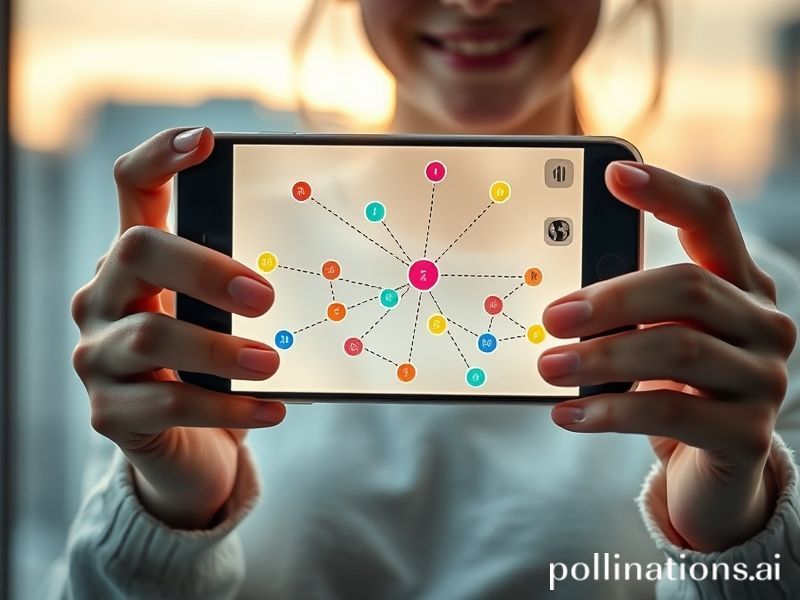Global Puzzle Panic: How the Humble ‘Connections Hint’ Became Earth’s New Lingua Franca
The Word That Launched a Thousand Slack Channels
By Dave’s International Desk, 06:12 UTC, somewhere above the 38th parallel
In a world already tethered together by undersea cables, crypto memes and the faint hope that the next Wi-Fi network won’t ask for your mother’s maiden name, the phrase “connections hint” has become the newest diplomatic passport. At first glance it sounds like something a lonely algorithm whispers to itself at 3 a.m.; in reality, it is the polite fiction that lets us pretend we still understand one another. One moment you’re sipping a flat white in Melbourne, the next you’re decoding a pastel grid in Lagos because your cousin in Toronto sent a screenshot with the caption “connections hint?” The planet has officially agreed to outsource small talk to four-colored squares.
The game, of course, is the New York Times’ “Connections,” a daily ritual that has quietly colonized every time zone like a polite version of the British Empire. Each puzzle splits sixteen words into four categories that are never quite what they seem—unless you happen to speak every dialect of English simultaneously and possess the cultural memory of a trivia-night savant. The “hint” is the life raft thrown to the drowning: a nudge, a wink, a digital shoulder squeeze that says, “We’ve all been there, champ.” In the process it has become the Esperanto of procrastination, uniting office workers in Jakarta with insomniac students in São Paulo under the shared delusion that taxonomy equals therapy.
Consider the geopolitics. When a Beijing hedge-fund analyst messages a “connections hint” to a colleague in Frankfurt, the payload is more than vocabulary. It’s a breadcrumb of soft power, a reminder that American pop culture still sets the global agenda even when its own Congress can’t decide what day it is. Meanwhile, Russian troll farms—never ones to miss an opportunity—have reportedly weaponized the puzzle, sliding faux hints into chatrooms to harvest metadata faster than you can say “synonym for ‘cattle’ that’s also a programming language.” The Cold War had Berlin; the lukewarm war has Wordle-adjacent mind games.
Then there’s the economic angle. Entire micro-economies have sprouted around the hint economy itself. In Nairobi, gig workers sell spoiler-free nudges via M-Pesa for the price of a cup of chai. South Korean BTS-stan Discord servers auction off ultra-soft clues (“think Jungkook’s favorite color but sadder”). Even the Vatican has dipped a toe: rumor has it the Swiss Guard’s internal Slack features a bot that doles out ecclesiastical hints in Latin, because nothing says “mystery of faith” like a dead language helping you group “APPLE, FRANCISCAN, DOVE, SERAPHIM.”
And yet, beneath the chuckles and crypto-payments lies a darker truth: the hint is the last socially acceptable cry for help. We used to ask neighbors for sugar; now we beg strangers on the internet to validate our pattern-recognition skills. The puzzle is merely the MacGuffin. The real story is how willingly we’ve surrendered the dopamine drip of discovery to a faceless editorial staff in Manhattan who, sources confirm, laugh maniacally every time they slip “things that are also Bond villains” into the purple category.
Will the fad last? Historically, humanity’s collective attention span is shorter than a TikTok clip played at 2× speed. But the underlying hunger won’t vanish. Long after “Connections” is replaced by “Synergy” or “Vibes” or whatever pastel horror the algorithm births next, the connections hint will endure as a linguistic fossil: proof that in an age of surveillance capitalism, the most intimate thing you can share is a whispered half-answer to a question nobody asked.
So the next time your phone pings with a plaintive “connections hint?” remember you are not merely solving a puzzle. You are performing an act of transnational diplomacy, propping up an informal economy and, most importantly, reaffirming the universal human right to feel momentarily clever before the next existential crisis arrives—scheduled, naturally, for tomorrow’s grid.







